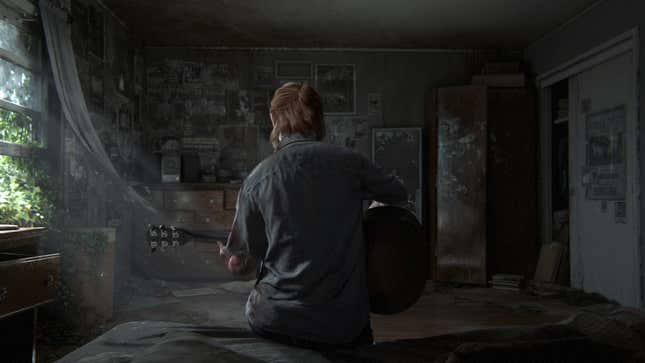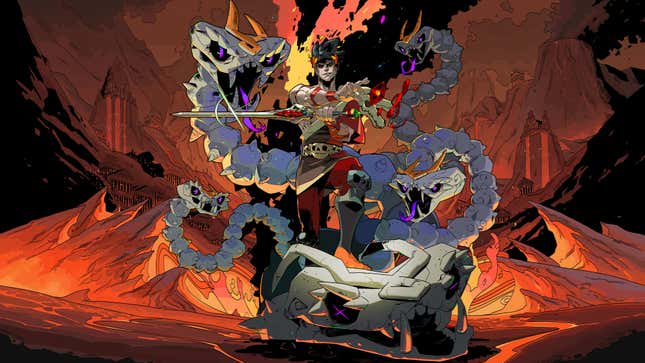
Last night, The Last of Us Part II walked away from The Game Awards with seven trophies, including those for Game of the Year, Best Narrative, Best Audio Design, Best Performance (by Laura Bailey as Abby), Innovation in Accessibility, and Best Action/Adventure. Arguments can be made as to whether it deserved those or not, but I think it’s pretty obvious that no game that required its developers to crunch, like The Last of Us Part II did, should be given a Best Direction award, which The Last of Us Part II somehow also won.
According to The Game Awards’ website, the Best Direction award is given for “outstanding creative vision and innovation in game direction and design.” This description makes it clear that the responsibility for winning or losing this award rests squarely on the shoulders of the people in charge of leading development. In the case of The Last of Us Part II, this would be director and Naughty Dog co-president Neil Druckmann, who is often credited as the auteur behind the game’s successes.
It’s no secret that Naughty Dog subjected its workers to unbelievable levels of crunch to get The Last of Us Part II out the door, but that’s hardly an innovation when it comes to Naughty Dog or game development in general. Over the years, the studio has seen constant employee turnover as developers crunch on games like The Last of Us and Uncharted, burn out, and throw in the towel. Relentless overtime, missed weekends, long stretches of time without seeing your family—these things take a toll on even the most passionate artist.
“This can’t be something that’s continuing over and over for each game, because it is unsustainable,” one The Last of Us Part II developer told Kotaku earlier this year. “At a certain point you realize, ‘I can’t keep doing this. I’m getting older. I can’t stay and work all night.’”
Let’s be clear: the existence of crunch indicates a failure in leadership. It’s up to game directors and producers to ensure workloads are being managed properly and goals are being met. If workers are being forced to crunch, explicitly or otherwise, it means the managers themselves have fallen short somewhere, either in straining the limits of their existing staff, fostering an environment where overtime is an implied (if unspoken) requirement, or both. And as ambitious as The Last of Us Part II director Neil Druckmann and his projects may be, “questionable experiments in the realm of pushing human limits” are not required to make a great game.
Hades—and, tacitly, those directing its development at Supergiant—was up for the Best Direction award last night too. It’s a great game, just as good as The Last of Us Part II and arguably better in some ways. Why it didn’t win Game of the Year is a subjective discussion I’m not interested in right now, but Hades deserved to win for Best Direction, at least more so than The Last of Us Part II, thanks to the studio’s meaningful avoidance of crunch culture across its various projects.

“You mention sustainability,” Hades writer and designer Greg Kasavin told Kotaku last year. “That’s a word we use a lot, and it’s something that we really highly prioritize as a team. We’ve been working together for 10 years. The percentage of folks on the team that have gotten married or had kids or something is quite a bit higher than when it was just [Supergiant studio director Amir Rao] and [co-founder] Gavin Simon in the living room of a house and a kind of startup company lifestyle. It’s like, if we’re gonna be around for the long haul, we can’t operate the same way we did when we were just getting started.”
Supergiant offers its employees unlimited time off, requiring every worker take at least 20 days for themselves every year. Emails stop being sent out after 5 p.m. on Friday. They say everyone keeps an eye on everyone else to make sure no one is getting burnt out. Much in the same way crunch culture is partially borne of good qualities like passion and dedication, these and various other decisions have created a culture at Supergiant where people learn to take care of themselves and their coworkers, by simply being mindful of the kind of environment they foster with their own actions.
I don’t hate The Last of Us Part II. I don’t hate Naughty Dog nor Neil Druckmann nor anyone else involved in its development. Who has the time? But I will say that I am disappointed by The Game Awards, show creator Geoff Keighley, the show’s advisory board, and the unnamed journalists and developers whose opinions are heavily weighted in deciding the winners and losers. I feel like the industry, now more than ever, is willing to discuss the dangers of crunch culture and solutions to eradicate it. But lavishing praise on the way The Last of Us Part II was directed feels like a tacit endorsement of crunch and only serves to push that conversation to the backburner again.
A popular online statement, first coined by Fanbyte podcast producer Jordan Mallory, says, “I want shorter games with worse graphics made by people who are paid more to work less and I’m not kidding.” The message from all those who share it is clear: No game, not even industry darling The Last of Us Part II, is worth destroying lives to create.